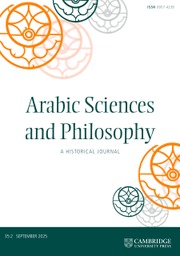No CrossRef data available.
Article contents
“SUBJECT GENERALITY” AND DISTRIBUTION IN MEDIEVAL ARABIC SYLLOGISTIC
Published online by Cambridge University Press: 09 August 2023
Abstract
A relatively well-known medieval Latin innovation is the doctrine of distributive supposition. This notion came to be used in syllogistic theory in the late medieval and early modern periods, as Latin logicians sought to establish general rules for syllogistic productivity across the various figures. It is much less well-known that some logicians in the medieval Arabic tradition also attempted to establish general rules for the syllogism, appealing to what they called “subject generality.” In the present article, I introduce this use of “subject generality” in some influential Arabic works on logic from the thirteenth century to the sixteenth, specifically Al-ǧumal by Afḍal al-Dīn al-Ḫūnaǧī (d. 1248) and Tahḏīb al-manṭiq by Saʿd al-Dīn al-Taftāzānī (d. 1390) and some of their commentators. I also compare this concept of “subject generality” to the Latin concept of “distribution.”
Résumé
Une innovation latine médiévale relativement bien connue est la doctrine de la supposition distributive. Cette notion est venue à être utilisée dans la théorie syllogistique à la fin du Moyen Âge et au début de la période moderne, alors que les logiciens latins cherchaient à établir des règles générales pour la productivité syllogistique à travers les différentes figures. Il est beaucoup moins connu que certains logiciens de la tradition arabe médiévale ont également tenté d’établir des règles générales pour le syllogisme, faisant appel à ce qu’ils appelaient la « généralité du sujet ». Dans le présent article, j’introduis cette utilisation de la « généralité du sujet » dans certains ouvrages arabes influents en logique du XIIIe au XVIe siècle, en particulier Al-ǧumal par Afḍal al-Dīn al-Ḫūnaǧī (mort en 1248) et Tahḏīb al-manṭiq par Saʿd al-Dīn al-Taftāzānī (morten 1390) et certains de leurs commentateurs. Je compare également ce concept de « généralité du sujet » au concept latin de « distribution ».
- Type
- Research Article
- Information
- Copyright
- Copyright © The Author(s), 2023. Published by Cambridge University Press




